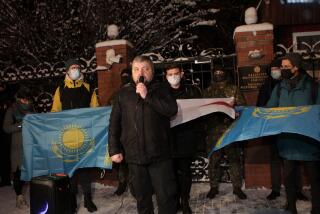Losing Faith in Mikhail the Savior : Armenia: Moscow’s refusal to deal with Nagorno-Karabakh has turned a peaceful, constitutional movement into a madly raging crisis.
- Share via
YEREVAN, Soviet Union — In February of 1988, Armenians here began their movement for democracy and self-determination bearing the portrait of Mikhail S. Gorbachev the savior. Today they have come to regard him as a dictator in disguise, his politics mere window dressing for the West.
Soviet Armenia’s disenchantment with Gorbachev is, indeed, deep and widespread. This smallest of Soviet republics--long known as Moscow’s loyal satellite--has reached its political boiling point and embarked on a seemingly irreversible reassessment of its fidelity to the center.
This loss of faith is the natural consequence of heightened Armenian expectations and broken Kremlin promises. It was, after all, the surging tide of perestroika and Gorbachev’s initial profession of solidarity that encouraged the Armenian majority of the Autonomous Region of Nagorno-Karabakh--an ancient Armenian province awarded by Josef Stalin in 1923 to neighboring Soviet Azerbaijan--to demand reunification with the Armenian republic.
The Armenians of Karabakh, joined by their compatriots in Soviet Armenia, have for two years carried forward their campaign for miatsum , or union, under international law and Article 70 of the Soviet Constitution, which guarantees the right to self-determination. In so doing, they have tried to convince Moscow that Stalin’s errors should be rectified across the board and that the success of the Soviet reform program is inextricably connected with a positive solution to the Karabakh question.
But the Soviet leadership has had neither the political courage nor the legal wisdom to act on the Armenian demands. This indifference to the country’s nationality problem and Moscow’s propensity to equate both parties to a dilemma--notwithstanding the historical correctness of one side--have helped turn a peaceful, constitutional movement into a madly raging crisis.
The Supreme Soviet last month only made matters worse when it summarily decided, despite Armenian protest, to leave Karabakh under Azerbaijani jurisdiction. As such, Moscow flouted the recognized right of Karabakh’s population to determine its collective destiny and refused to extend perestroika from the European theater into the domestic arena.
The Armenian response to Moscow’s politics of equation has been a joint declaration by the Soviet Armenian legislature and Karabakh’s National Council of a united republic of Armenia and Karabakh. The proclamation confers Armenian citizenship upon the residents of Karabakh and voting privileges in the Armenian Supreme Soviet upon the outlawed National Council, the members of which unanimously decline Azerbaijani authority.
The Azerbaijanis, upset by Armenian actions and declarations, have attempted to starve Armenian defiance into submission by renewing their siege of Armenia and Karabakh and cutting off petroleum, relief materials and other goods destined for the zones ravaged by the December, 1988, earthquake. As a result, reconstruction efforts there have come to a halt and the winter plight of homeless thousands has reached inhuman proportions.
Yet, Moscow, that great seat of power, has been unable--or unwilling--to lift a blockade that not only threatens the livelihood of one of its constituent republics, but also calls into question its own authority and ability to manage its internal affairs.
No more probative evidence of this power failure--or contemplated apathy--exists than upon the borders of Armenia and Azerbaijan, where today an undeclared civil war is in the making. The Azerbaijanis, emboldened by the Soviet Union’s show of helplessness, have peppered their blockade with a series of military operations aimed at Karabakh and the Armenian frontier.
The Armenians have lost the final trace of faith in the Soviet security troops sent to the area “to keep the peace,” and accordingly have vowed to defend their settlements against foreign incursion.
If the Soviet Union, which claims to revere fundamental human liberties, desires to make entry into the world community, then it must play by the rules. It must guarantee the security of its citizens and live up to the legal standards imposed on it by a host of international covenants to which it is a party.
The Kremlin can demonstrate its respect for the rule of law--window dressing notwithstanding--by immediately breaking the Azerbaijani blockade of Armenia and holding a free plebiscite in Karabakh to determine its people’s political future.
Otherwise, Soviet Armenia, the loyal republic, may have no choice but to resort to something it has resisted all these years--dropping extraneous adjectives and proclaiming the national will.
More to Read
Sign up for Essential California
The most important California stories and recommendations in your inbox every morning.
You may occasionally receive promotional content from the Los Angeles Times.













